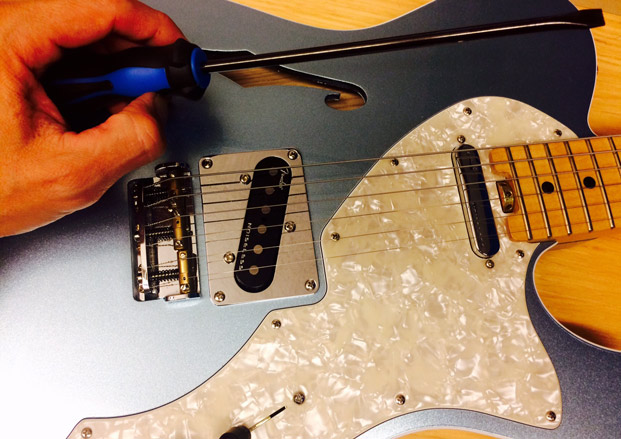Guitar 911: Six Tips for Maintaining Your Guitars
Like to keep your axes in tip-top shape? Here are a few solid tips to do just that.

Like to keep your axes in tip-top shape? Here are my six tips for maintaining your guitars.
1. Keep your old strings. You never know when they might come in handy. Old strings will work for:
• Replacement strings or backups for 1/2- or 3/4-size guitars.
• Pulling pots, output jacks and other electronics through a semi-hollow body guitar
• Backups, if you pop a string
• String repairs.
2. Start and maintain a guitar-parts pile. Have a junky old acoustic or electric guitar that got smashed at a party, a la Animal House? Before you throw it out, strip the tuners, nut, any string retainers, saddle, endpin(s), pickguard, output jack, pots, pickups, pickup selector switches, bridge, neck plate, screws, pre-amps, etc. If it's there, take it. Just the body is smashed? Keep the neck. The neck was broke in half? Keep the body. You never know when you'll need one or more of those old parts.
3. Start and maintain a guitar touch-up kit containing different-colored finish pencils, magic markers, paint markers, different glues, etc. We're talking Elmer's glue, wood glue, hider's glue, etc. Do the same with any special rubbing compounds and cleaners you use.
4. Try to keep all guitar-centric tools in one spot. If you've ever used it on your guitar, chances are you will again. Neck rest, side cuts, files, sandpaper, screwdrivers, allen wrenches, etc. Nothing is more frustrating than knowing you have a tool in the house that worked well on a guitar before, but you can't remember what you did with it. Especially when the project requires multiple tools you've used before.
5. Establish some good working habits when working on guitars. For example, if you're pulling screws out temporarily, use a shot glass or cup to keep all the screws together until it's time to put them back in. The same goes for parts like knobs, tuners, etc. Keep others away from your working area during the project (kids, friends, neighbors) because people like to touch things, even if it's just picking up a part and looking at it. If it gets set back down elsewhere, it can get lost real quick.
Get The Pick Newsletter
All the latest guitar news, interviews, lessons, reviews, deals and more, direct to your inbox!
6. Anticipate cleaning up and returning all tools and parts immediately after the maintenance/repair is done. The longer that stuff sits around, the greater the chance you're going to lose something you'll need for your next project.
Check out Joe Becker online at joebeckermusic.com.
"Upgrading from your entry-level acoustic opens the door to an entirely new world of tonewoods, body shapes, and brands": 6 signs it's time to upgrade from your first acoustic guitar
"I'm past my prime": 5 common excuses for not learning the guitar – and 5 body and mind-boosting reasons you should

![John Mayer and Bob Weir [left] of Dead & Company photographed against a grey background. Mayer wears a blue overshirt and has his signature Silver Sky on his shoulder. Weir wears grey and a bolo tie.](https://cdn.mos.cms.futurecdn.net/C6niSAybzVCHoYcpJ8ZZgE.jpg)

![A black-and-white action shot of Sergeant Thunderhoof perform live: [from left] Mark Sayer, Dan Flitcroft, Jim Camp and Josh Gallop](https://cdn.mos.cms.futurecdn.net/am3UhJbsxAE239XRRZ8zC8.jpg)






